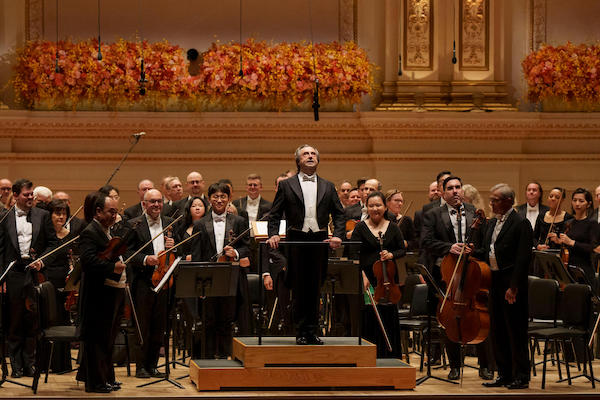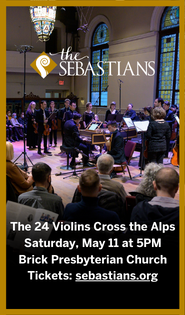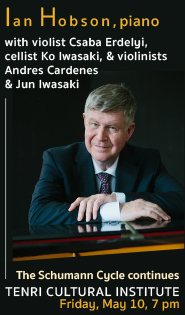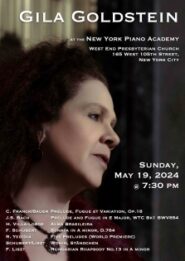New Glass is clear highlight of CSO’s streamlined Italian tour

There’s something almost existential about the Carnegie Hall concerts from the Chicago Symphony Orchestra under conductor Riccardo Muti. Through the years they have been played at the highest technical level and with dedicated attention to the score. And yet they’re also been almost devoid of any expressive presence, any idea that Muti and the musicians want the music to say something to the audience. One wonders why they’re playing what they’re playing, and if the action itself will produce any sense of purpose.
Tuesday night in Carnegie, for their second concert of their season-opening visit, Muti and the CSO had a stated purpose in mind. The program was a musical picture of Italy, courtesy of a new piece by Philip Glass, Mendelssohn’s “Italian” Symphony (No. 4), and Aus Italien from Richard Strauss. With one exception, this was the CSO experience one has come to expect but in a different style: the music-making this time was like Richard Gere in American Gigolo—polished and sleek in Armani, and attractive on the outside but empty inside.
The concert opened with the New York premiere of Glass’s The Triumph of the Octagon. Again the Italian/Muti connection was its inspiration, the famous medieval Castel del Monte, with its octet of octagonal towers. The program note made the curious remark that the piece has joined “the very slight list of architectural landmarks that have inspired music”—literally true but also irrelevant in the context of Western classical composition, which is sonic architecture in time.
Glass, who was in attendance, is one of the great builders, and The Triumph of the Octagon uses his trademark slow arpeggios and three-against-four rhythms, in this instance to make perhaps the most serene and graceful music one has heard from him. The piece had two main ideas, a delicate, tender phrase that seemed to represent each tower, and then a long, unified orchestral crescendo that wrapped everything in the larger form. Moving from minor to major key, this was sonically and emotionally lovely, and an exemplar of Glass’s current style, which sounds as fresh as always while also being utterly transparent about his roots in 19th century classical music.
The CSO’s playing seemed ideal, the strings as refined as the music, and the crescendo was as smooth and expertly guided as could be. Perhaps the newness of the music motivated conductor and musicians, because the playing had a clear, strong feeling to it.
Not so the rest of the evening.
Mendelssohn’s “Italian” symphony is one of the liveliest works in the repertoire, especially the invigorating bounding phrase of the opening movement. It’s also balanced with complex feelings of nostalgia and warmth, particular in the second, “Andante con moto,” movement.
But this performance was a strange experience, feeling almost rote. The orchestra’s skill is so high that this mostly sounded quite fine—there were a few fleeting but unexpected moments in the first and third movements where the string articulation was not fully in sync. Part of the orchestra’s skill is having sufficient energy to give some force to the music, yet there was no sense that there was any thinking behind it other than getting to the end of the phrase or following the dynamic markings.
That same pattern held true for Aus Italien, after intermission. The absence of deeper interest was compounded by the selection itself. This is not one of Strauss’ better scores, although he was pleased with himself over it. It’s a preliminary exercise in his later pictorialism, and doesn’t have the technical skill or imaginative depth of his great tone poems.
But it was about Italy, so presumably that’s all Muti needed. This was another high-technique, low-commitment traversal that satisfied most of the listeners, even as the “Faniculi, faniculà” theme in the final movement sounds in the 21st century like self-parody, Strauss reinforcing the point of why his music found its way into so many cartoons.
For an encore, Muti kept it Italian, with the overture from Verdi’s patriotic opera Giovanna d’Arco. But even the sheer force of passion and humanity couldn’t inspire anything more than precise physical energy. Muti is now in the bizarre position, starting this season, of being the CSO’s music director emeritus for life—retired but seemingly never leaving, expertly keeping this orchestral Ferrari guided down the centerline on a highway to nowhere. The evening recalled another film, Lost Highway.
The Orchestra of St. Luke’s and conductor Jahja Ling play Rossini, Kodály, and Saint-Saëns, with pianists Lang Lang and Gina Alice Redlinger, 8 p.m., October 12. carnegiehall.org






Posted Oct 06, 2023 at 6:48 pm by Moselle Eugen
Riccardo Muti inhabiting a version of automatic transmission — not a total surprise. I would not be so dismissive of Aus Italien; I would rather hear it live than another Don Juan.
Posted Oct 06, 2023 at 8:30 pm by Fran Caloux
I think Muti should jump more, get bigger drums and Mr. Grella will be happy!
Posted Oct 07, 2023 at 4:41 pm by MarkinCal
I lived in Chicago during most of the Muti era. I personally like how he transformed the CSO into an orchestra with a warmer, more balanced sound. Some concertgoers prefer the more aggressive Solti sound. Tastes differ.
I have always found Muti at his best with contemporary works, and he premiered many in Chicago. Although this seems surprising given his otherwise conservative (and often repetitive) programming, it emphasizes what a highly skilled and serious conductor he is. The New York programming has been performed often by these forces other than the new Glass piece.
As to the standard repertoire, I found Muti to be satisfactory to good. I like many of his recordings from the Philadelphia era, and often found them to be as good, if not better, than some of his Chicago performances and recordings. Very often, there wasn’t much that was profound in his performances, and broaden tempos made some performances laborious.
So it’s definitely time for a change in Chicago, but it remains to be seen who the CSO will select. Personally I’d like to see someone less legendary but more energetic and with a broader repertoire.
Posted Oct 08, 2023 at 10:05 am by John F Kelly
Muti is not a “Strauss conductor”; to the best of my knowledge he doesn’t conduct the more well-known tone poems. It was interesting to hear Aus Italien, a sort of longer version of Elgar’s “In the South,” which Muti also conducts rather well. His performance of Aus Italien was just fine, it’s not a great work, but I found this performance the equal of the much-lauded Kempe recording and so not lacking in any regard.
The Verdi encore was right in Muti’s wheelhouse, rarely heard and much fun, brilliantly executed. I found the Mendelssohn exactly as Mr Grella described, and sounding more like Mozart than Mendelssohn in many sections. Muti knows this music of course, but somehow it didn’t spring to life.